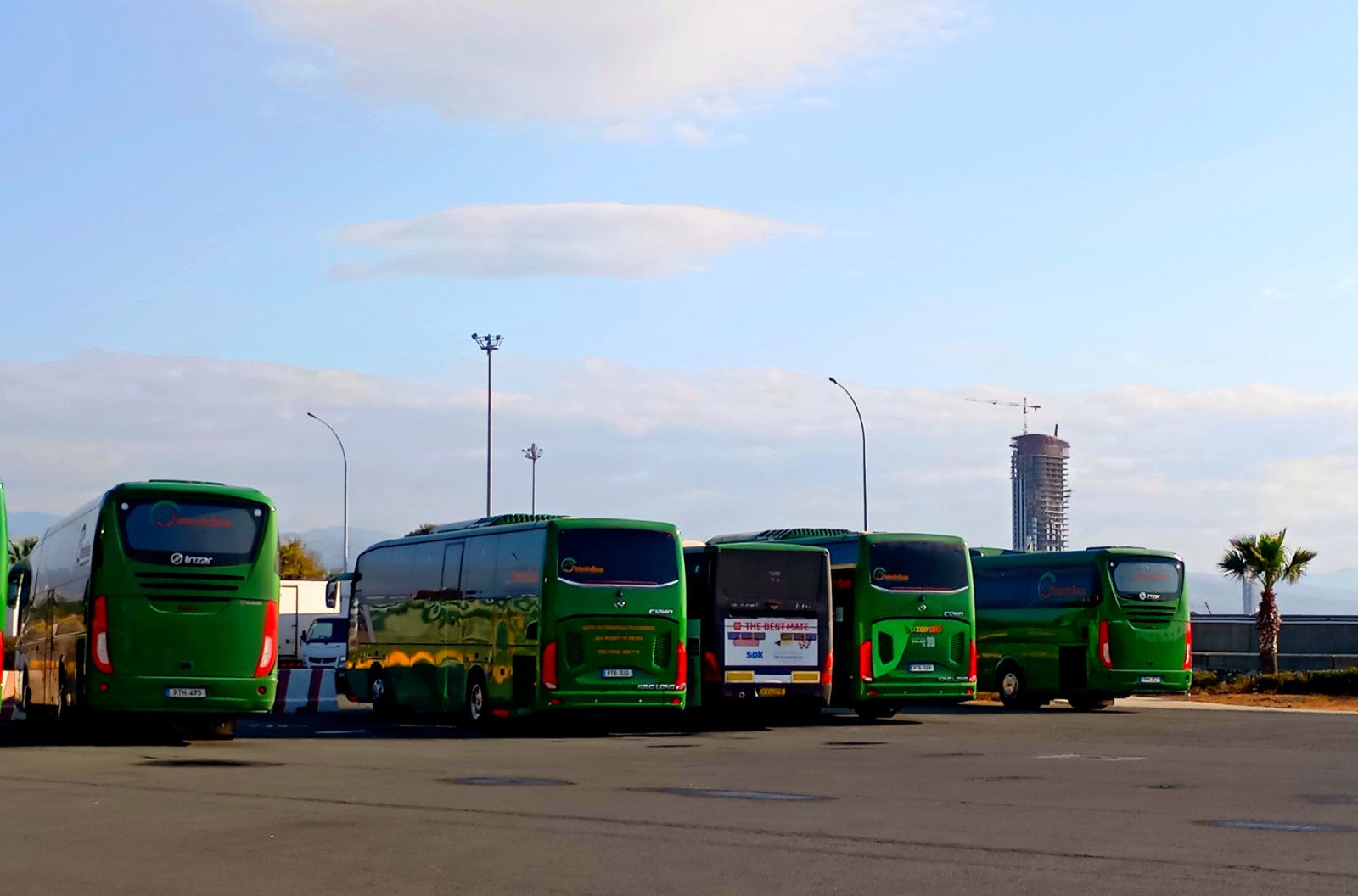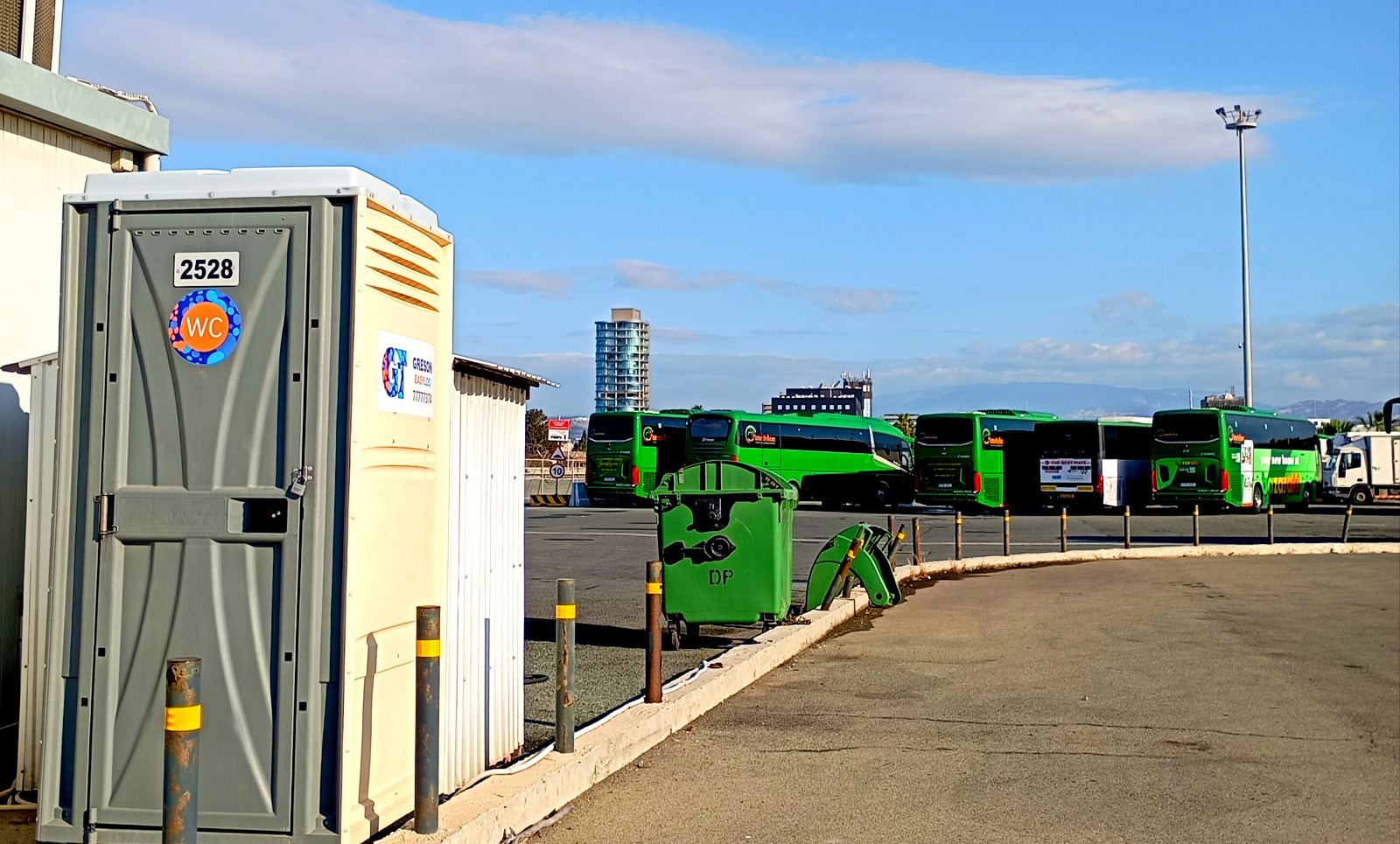Limassol's new port is also home to a bus terminal yet public facilities are still lacking
The new Limassol port has rapidly become a daily reminder of Cyprus’ omission to provide the general public with basic facilities.
Quite aside from the busy port and cruise ship centre, the area functions not merely as a bus stop but also as a central transport terminal, where intercity buses from every major city begin and end their routes.
Dozens of people use the space each day to travel, to work, to walk, to exercise and even to learn to drive in the surrounding car park. Yet despite this constant use, the basic infrastructure remains inadequate. The toilets are kept locked except when cruise ships arrive, which is also when the sole kiosk is open. Locals, including the elderly, workers and people with disabilities, must manage without access to water, shelter or hygiene facilities.
On one occasion, a person with mobility problems was forced to beg to use a portable toilet – usually locked and only for staff. It was in poor condition, without toilet paper, without cleaning facilities and with no access for wheelchair users.
Michel V Christensen, director of port regulation, explains that since 2017 three private companies have managed key operations at the port, raising questions about the role of private firms in providing public services and why Limassol municipality has not ensured proper facilities.

Eurogate manages the container terminal, DP World operates both the general cargo and cruise terminals, and P&O Maritime provides marine services such as tugging and piloting.
“In 2016, the government began the port’s commercialisation to improve operations and bring in international expertise,” says Anthimos Christodoulides, general manager of the Cyprus Ports Authority (CPA).
“It was a strategic step to modernise our maritime infrastructure and attract long-term investment.”
DP World, in partnership with G.A.P. Vassilopoulos, secured a 25-year concession for the cargo and cruise terminal, while P&O Maritime received a 15-year contract for marine services. Cyprus received €10 million upfront, with €1.9 billion expected over time.
Christensen adds that the terminal is regulated by the international ship and port facility security (ISPS) code, which restricts access to passengers and authorised personnel.
“When no cruise ship is due, the terminal remains locked for security.”
DP World states that the cruise terminal was built with accessibility in mind: ramps, wide doorways, lifts, tactile paths and accessible toilets, with staff on hand to assist passengers with reduced mobility. But none of this is of any use when no cruise ships are there.
Speaking to the Cyprus Mail, Xenophon Andreotis, president of the Intercity Buses board, clarifies that although Intercity buses use locations across Cyprus, including at Limassol’s new port, the site beside the cruise terminal is not an official Intercity station.
“It is a regular, designated bus stop like hundreds of others across the island,” he says.
“Intercity has no authority to develop or use the space beyond brief stops for boarding and disembarking.”
Andreotis explains that land and usage rights at Limassol’s new port lie with the CPA and DP World. Any infrastructure surrounding the terminal, including the chemical toilets – which are not for public use – outside the passenger building, has been provided by port operators.
“These toilets were placed by port authorities for cruise-related staff. Intercity has no involvement,” he adds.
On the matter of passengers with disabilities, Andreotis notes that Intercity buses complied fully with national accessibility standards. He also points out that a secured depot exists 200 metres away for Intercity’s internal use, but it is not open to the public.
DP World Limassol reiterates that its remit covers only the cruise terminal building.
“No official complaint regarding the incident you described has been received by DP World Limassol,” the company tells the Cyprus Mail.
“We are responsible for the cruise terminal’s operation, not for public areas outside it.” It states that it understands any discomfort and remains committed to an inclusive environment for all passengers, staff and visitors.
The ministry of transport’s chief executive engineer, Stelios Zervos, defends the arrangement, noting that restricted access follows international safety regulations. He states that the public may use alternative infrastructure, without specifying where or whether these facilities meet accessibility requirements.
Zervos confirms that toilets inside the passenger hall (Pod 5) serve taxi and bus drivers during cruise arrivals but are not open to general bus passengers. When no ship is docked, a single portable toilet remains available, for which DP World holds responsibility.
He adds that DP World applied to run a kiosk or café in the car park but withdrew due to urban planning restrictions; a small prefabricated kiosk now operates only during ship calls.
“This is not a luxury, it’s a basic human need. Locals pay taxes too, and they should not be treated as second-class citizens at their own port,” a Limassol resident remarks.
An intercity bus driver adds:
“Tourists come expecting cafés, restaurants and monuments, much like ports abroad. When they arrive at Limassol new port, they’re disappointed, they can’t use the toilet or get a drink, so they leave for the town centre. They end up paying again for the return bus ticket. It’s very disappointing for our government. What will tourists think of our country when they return home? That we’ve neglected this beautiful new port for money, since the terminal only opens for cruise ships. That’s sad.”
The deputy ministry of tourism says it is fully aware of concerns and has made recommendations to the port operator, including the installation of public portable toilets outside the main terminal. It emphasises it only has a supportive, not supervisory, role, with overall management resting with the CPA.
Speaking to the Cyprus Mail, the ministry stressed its commitment to improving services for both locals and visitors alike.
“We have already submitted several representations, recommendations, and suggestions to the managing company of the new port of Limassol to ensure they are effectively addressed.”
In the meantime, bus passengers will have to cross their legs, wear a hat, take their own refreshments and make sure they are not in a wheelchair.






Click here to change your cookie preferences